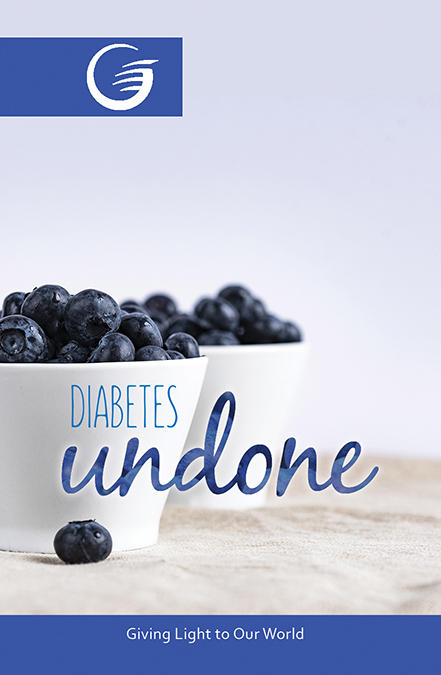
Diabetes Undone
$6.99
Diabetes Undone
Struggling with high blood sugars? You’re not alone. Today, almost half of American adults have diabetes or prediabetes. These conditions significantly increase the risk of heart disease and many other devastating complications. They also suck the joy out of life and cause a fear of the future.
Did you know that even prediabetes is dangerous? This condition more than doubles the risk for a heart attack, whether or not it ever progresses to full blown diabetes.
The outlook seems grim, but there’s nothing to fear when you understand the good news: type 2 diabetes and prediabetes are reversible. Diabetes can be undone!
Hope for Change
Most people diagnosed with type 2 diabetes or prediabetes are simply told that they must manage the lifelong condition so it doesn’t progress. This outdated paradigm causes fear and discouragement.
In reality, there are thousands who have not just managed but have reversed high blood sugars and other chronic health conditions. The power of lifestyle habits such as nutrition and exercise have transformed their bodies, lives, and health so much that they no longer fit the criteria for diabetes or prediabetes.
But How Does it Work?
The only way to fight diabetes is to address its underlying cause: insulin resistance. Insulin is the key that unlocks your cells and allows glucose (sugar) to enter. This process regulates your blood sugars.
People with Type 1 diabetes stop producing insulin, so they have to take insulin injections to stay alive. Without insulin, sugar builds up in the blood and becomes dangerous.
People with prediabetes and type 2 diabetes still do produce insulin, but the insulin has a hard time unlocking the cells. Why? Insulin resistance causes your cells to become fat and sassy. They don’t want to allow much sugar in, so they go on strike. This causes high blood sugars and extra high insulin levels that can lead to weight gain, high blood pressure, cancer growth, and even dementia. In fact, modern research reveals that Alzheimer’s is actually insulin resistance of the brain.
But insulin resistance can be reversed! The same strategies that will help you fight diabetes will also reduce your health risks across the board. How? One choice at a time.
One Walk at a Time
You know that exercise helps control diabetes, but did you know that timing makes a huge difference? After-meal exercise is a secret weapon for blood sugar control.
Blood sugars spike highest 45-60 minutes after you start eating. These spikes cause tissue damage throughout the body. You can minimize these sugar spikes by moving your body after each meal, making your muscles eager to accept the glucose from the food you ate.
You can potentially reduce your blood sugar spike from one to three points for every minute you exercise after a meal. If your blood sugar usually spikes to 200, you might lower that by 20-60 points simply by taking a 20-minute walk.
So why not start today? Stand up and go for a walk after you eat. Fifteen minutes or more is a great goal, but even five or ten minutes can help. Do this as often as you can. You’ll notice a difference if you move after your meals.
One Meal at a Time
Hippocrates, the father of Western medicine, once said: “Let food be your medicine, and medicine be your food.” Healthful food is powerful medicine.
In one study, researchers placed 650 people with diabetes on a high fiber, plant-based diet—much like the original diet described in the Bible in Genesis 1 and 2. It didn’t take long for blood sugars to drop. In just two short weeks, 71 percent of the participants on oral diabetes medications were able to discontinue those drugs and 39 percent of those on insulin stopped it completely. Participants also experienced major improvements in blood pressure, cholesterol, and weight.
What’s the best diet for diabetes? A study by Dr. Neal Barnard set out to answer this question. The study included 100 people with type 2 diabetes. Half were assigned to follow the diet recommended by the American Diabetes Association, emphasizing carbohydrate counting or exchanges. The other half ate a plant-based diet low in fat and sugar. They didn’t count calories or carbs but avoided animal products, sugary foods, and added oils.
Both groups improved, but the plant-based diet was three times more effective at lowering blood sugars. This group also lost twice as much weight, lowered cholesterol, and experienced multiple other health benefits. Many participants eventually reversed diabetes completely.
The ADA diet didn’t lead to medication adjustments, but two-thirds of those on the plant-based diet lowered their medications.
Want to unleash the power of nutrition for your health? Build your meals around non-starchy vegetables and legumes (beans and lentils). Legumes are a secret weapon for blood sugar control. Fill your plate with whole, plant-based foods. Avoid or greatly minimize animal products, refined grains, added oils, and sugars. Eat balanced meals with healthy carbohydrates, proteins, and fat. And remember that good hydration reduces cravings for food your body doesn’t need.
You can learn more nutrition information by reading Goodbye Diabetes or visiting www.diabetesundone.com. Check your blood sugars frequently and talk to your doctor when making these changes.
One Night at a Time
Your sleep habits directly impact your blood sugars. In one study, healthy young adults were restricted to four hours of sleep each night. After just six days, their blood sugars fit the criteria for prediabetes. That’s right. Sleep deprivation induced a prediabetic state in less than one week! But even one night of sleep deprivation triggers insulin resistance the next day. Follow these simple steps to improve your sleep:
- Set a sleep schedule.
Aim for an early and consistent bedtime. Sleep before midnight is deeper and more restorative than sleep after midnight.
- Get regular exercise.
Exercise helps you fall asleep faster, stay asleep longer, and have a better quality of sleep.
- Soak up the sun.
Bright light, especially early in the morning, helps keep your sleep and wake cycle on track.
- Be careful with naps.
Any naps should be short and early in the day. Long naps sabotage your sleep schedule.
- Don’t eat late.
Try to eat dinner at least three to four hours before you sleep. Make it the lightest meal of the day. Your energy needs are lowest at the end of the day, so this habit will help you manage your weight and sleep better.
- Say no to caffeine.
Caffeine may boost your energy in the short term, but it’s like living on credit. It compromises the quality of your sleep and eventually causes premature aging and fatigue
- Optimize your sleep environment.
Make sure the room that you sleep in is dark, quiet, and a little bit cool (60-68 degrees Fahrenheit).
- Learn to Manage Stress.
If there’s something in your life that keeps you up at night, do what you can to resolve it. Invest in your relational, emotional, and spiritual health. Consider learning more about the God of the Bible who assures us that the health principles in His word are “life to those who find them and health to one’s whole body” (Proverbs 4:22).
Dr. Wes Youngberg is the author of Goodbye Diabetes and the host of Diabetes Undone, a dynamic online video course on diabetes reversal. For more information, visit diabetesundone.com. Scripture taken from THE HOLY BIBLE, NEW INTERNATIONAL VERSION,® NIV® Copyright © 1973, 1978, 1984, 2011 by Biblica, Inc.® Used by permission. All rights reserved worldwide.
179 in stock
Diabetes Undone
Struggling with high blood sugars? You’re not alone. Today, almost half of American adults have diabetes or prediabetes. These conditions significantly increase the risk of heart disease and many other devastating complications. They also suck the joy out of life and cause a fear of the future.
Did you know that even prediabetes is dangerous? This condition more than doubles the risk for a heart attack, whether or not it ever progresses to full blown diabetes.
The outlook seems grim, but there’s nothing to fear when you understand the good news: type 2 diabetes and prediabetes are reversible. Diabetes can be undone!
Hope for Change
Most people diagnosed with type 2 diabetes or prediabetes are simply told that they must manage the lifelong condition so it doesn’t progress. This outdated paradigm causes fear and discouragement.
In reality, there are thousands who have not just managed but have reversed high blood sugars and other chronic health conditions. The power of lifestyle habits such as nutrition and exercise have transformed their bodies, lives, and health so much that they no longer fit the criteria for diabetes or prediabetes.
But How Does it Work?
The only way to fight diabetes is to address its underlying cause: insulin resistance. Insulin is the key that unlocks your cells and allows glucose (sugar) to enter. This process regulates your blood sugars.
People with Type 1 diabetes stop producing insulin, so they have to take insulin injections to stay alive. Without insulin, sugar builds up in the blood and becomes dangerous.
People with prediabetes and type 2 diabetes still do produce insulin, but the insulin has a hard time unlocking the cells. Why? Insulin resistance causes your cells to become fat and sassy. They don’t want to allow much sugar in, so they go on strike. This causes high blood sugars and extra high insulin levels that can lead to weight gain, high blood pressure, cancer growth, and even dementia. In fact, modern research reveals that Alzheimer’s is actually insulin resistance of the brain.
But insulin resistance can be reversed! The same strategies that will help you fight diabetes will also reduce your health risks across the board. How? One choice at a time.
One Walk at a Time
You know that exercise helps control diabetes, but did you know that timing makes a huge difference? After-meal exercise is a secret weapon for blood sugar control.
Blood sugars spike highest 45-60 minutes after you start eating. These spikes cause tissue damage throughout the body. You can minimize these sugar spikes by moving your body after each meal, making your muscles eager to accept the glucose from the food you ate.
You can potentially reduce your blood sugar spike from one to three points for every minute you exercise after a meal. If your blood sugar usually spikes to 200, you might lower that by 20-60 points simply by taking a 20-minute walk.
So why not start today? Stand up and go for a walk after you eat. Fifteen minutes or more is a great goal, but even five or ten minutes can help. Do this as often as you can. You’ll notice a difference if you move after your meals.
One Meal at a Time
Hippocrates, the father of Western medicine, once said: “Let food be your medicine, and medicine be your food.” Healthful food is powerful medicine.
In one study, researchers placed 650 people with diabetes on a high fiber, plant-based diet—much like the original diet described in the Bible in Genesis 1 and 2. It didn’t take long for blood sugars to drop. In just two short weeks, 71 percent of the participants on oral diabetes medications were able to discontinue those drugs and 39 percent of those on insulin stopped it completely. Participants also experienced major improvements in blood pressure, cholesterol, and weight.
What’s the best diet for diabetes? A study by Dr. Neal Barnard set out to answer this question. The study included 100 people with type 2 diabetes. Half were assigned to follow the diet recommended by the American Diabetes Association, emphasizing carbohydrate counting or exchanges. The other half ate a plant-based diet low in fat and sugar. They didn’t count calories or carbs but avoided animal products, sugary foods, and added oils.
Both groups improved, but the plant-based diet was three times more effective at lowering blood sugars. This group also lost twice as much weight, lowered cholesterol, and experienced multiple other health benefits. Many participants eventually reversed diabetes completely.
The ADA diet didn’t lead to medication adjustments, but two-thirds of those on the plant-based diet lowered their medications.
Want to unleash the power of nutrition for your health? Build your meals around non-starchy vegetables and legumes (beans and lentils). Legumes are a secret weapon for blood sugar control. Fill your plate with whole, plant-based foods. Avoid or greatly minimize animal products, refined grains, added oils, and sugars. Eat balanced meals with healthy carbohydrates, proteins, and fat. And remember that good hydration reduces cravings for food your body doesn’t need.
You can learn more nutrition information by reading Goodbye Diabetes or visiting www.diabetesundone.com. Check your blood sugars frequently and talk to your doctor when making these changes.
One Night at a Time
Your sleep habits directly impact your blood sugars. In one study, healthy young adults were restricted to four hours of sleep each night. After just six days, their blood sugars fit the criteria for prediabetes. That’s right. Sleep deprivation induced a prediabetic state in less than one week! But even one night of sleep deprivation triggers insulin resistance the next day. Follow these simple steps to improve your sleep:
- Set a sleep schedule.
Aim for an early and consistent bedtime. Sleep before midnight is deeper and more restorative than sleep after midnight.
- Get regular exercise.
Exercise helps you fall asleep faster, stay asleep longer, and have a better quality of sleep.
- Soak up the sun.
Bright light, especially early in the morning, helps keep your sleep and wake cycle on track.
- Be careful with naps.
Any naps should be short and early in the day. Long naps sabotage your sleep schedule.
- Don’t eat late.
Try to eat dinner at least three to four hours before you sleep. Make it the lightest meal of the day. Your energy needs are lowest at the end of the day, so this habit will help you manage your weight and sleep better.
- Say no to caffeine.
Caffeine may boost your energy in the short term, but it’s like living on credit. It compromises the quality of your sleep and eventually causes premature aging and fatigue
- Optimize your sleep environment.
Make sure the room that you sleep in is dark, quiet, and a little bit cool (60-68 degrees Fahrenheit).
- Learn to Manage Stress.
If there’s something in your life that keeps you up at night, do what you can to resolve it. Invest in your relational, emotional, and spiritual health. Consider learning more about the God of the Bible who assures us that the health principles in His word are “life to those who find them and health to one’s whole body” (Proverbs 4:22).
Dr. Wes Youngberg is the author of Goodbye Diabetes and the host of Diabetes Undone, a dynamic online video course on diabetes reversal. For more information, visit diabetesundone.com. Scripture taken from THE HOLY BIBLE, NEW INTERNATIONAL VERSION,® NIV® Copyright © 1973, 1978, 1984, 2011 by Biblica, Inc.® Used by permission. All rights reserved worldwide.
Each package contains 100 tracts.
Dimensions: 4.25 x 2.75 x 1.5 inches

